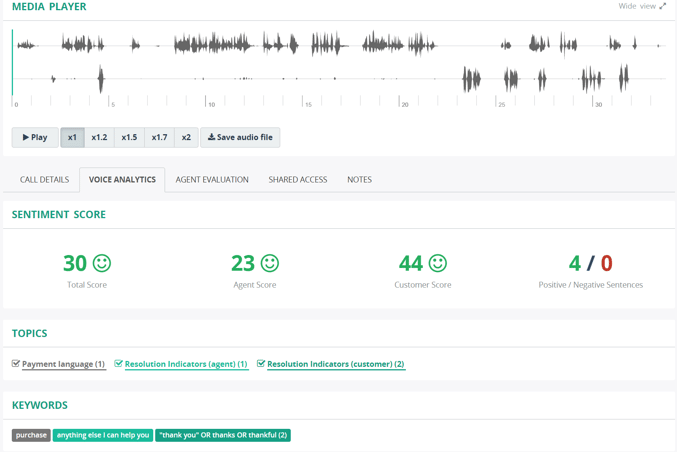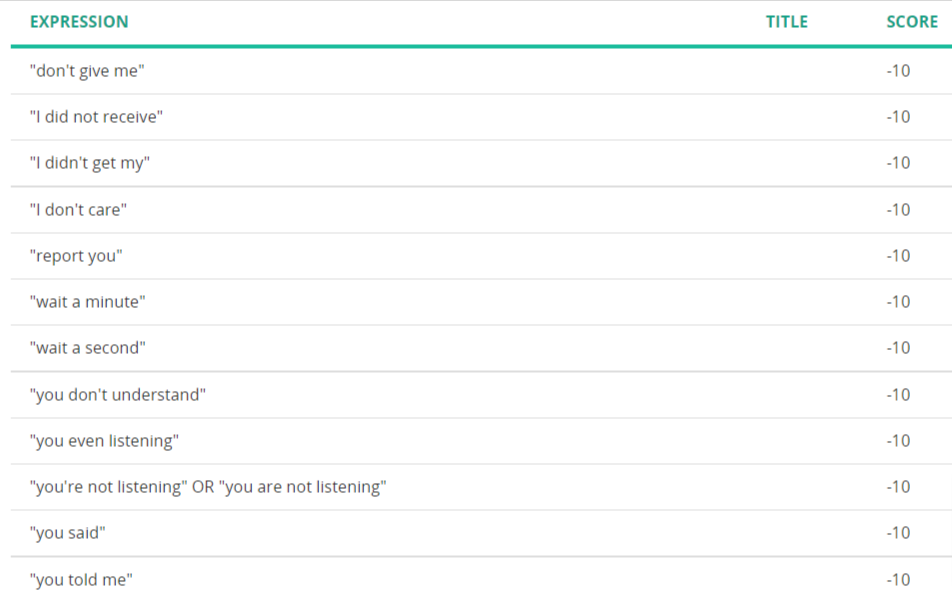How To Use AI To Drastically Improve Contact Center Script Adherence
Are you frustrated that your agents ignore carefully defined call scripts and just "wing it," often making customer interactions longer than they need to be? Are you looking for a way to enforce script adherence across the board but simply lack the resources to listen to every call and score it for quality assurance?
If you answered yes, you are not alone. Here at MiaRec, we have helped hundreds of organizations drastically boost script adherence by enabling them to utilize Artificial Intelligence (AI) and, as a result, improve contact center KPIs such as first-call resolution rates, call duration, and much more.
In this article, we will explore why script adherence is an ideal example of how AI can be used to improve service quality in your contact center. By the end of this article, you will have a clear understanding of how your organization can (and should) use AI to increase your agents' adherence to call scripts.
What Is Call Script Adherence & How Is It Enforced?
Contact center scripts are invaluable for ensuring the highest levels of customer service quality and regulatory compliance. They provide a predefined set of expectations rooted in best practices and corporate values that call center personnel can follow when interacting with customers, helping to ensure that interactions are consistent in tone and language.
Definition Of Call Script Adherence
Call script adherence can be defined as the degree to which an agent follows a predetermined script when interacting with customers while fulfilling necessary components on their checklist. These can include phrases like:
- "Hi, my name is [agent's name]."
- "Thank you for calling [Company Name]."
- "How can I help you today?"
- "I understand how irritating this is."
- "I apologize for the inconvenience."
- “Is there anything else that I can do for you?”
- “Have a good day, and thank you for your call!”
Due to the predefined format of scripts, customer service personnel better understand what is expected from them and how they should address customer requests. This helps to streamline conversations, which decreases the risk of miscommunication or misinterpretation.
Call scripts are created by reviewing customer interactions to understand what made a call successful as opposed to what made a call derail. A call script should never be considered finished, and it should see regular revisions, improvements, and finely-tuned tweaks.
How Call Script Adherence Is Enforced
Traditionally, a contact center supervisor would listen to recorded calls, view the call-script checklist of must-say words or phrases, check off which ones were said, and then score the agent's performance. For example, if an agent mentioned three of the ten during a call, they would score 30%.
Of course, 100% script adherence is not possible or even encouraged, and this example is highly simplified because we all know that reality is far more complex. After all, every call is unique. Also, certain phrases carry more weight than others, e.g., perhaps the agent was able to apply the script in the correct way to diffuse a potentially frustrating situation.
However, scoring agent performance, including script adherence, is a labor-intensive, repetitive, and tedious job that takes up a lot of resources and time — allowing supervisors to score only a tiny fraction of calls. The repetitive, tedious, and standardized nature of this task makes it the perfect job for Artificial Intelligence (AI) and automation!
How AI-Driven, Automated Quality Management Boosts Call Script Adherence
Automated Quality Management software utilizes machine learning and Natural Language Processing (NLP) to transcribe call recordings into text that can then be parsed by AI to automatically detect keywords or phrases from a predefined list. In addition to using it for customer retention and to increase profits, one highly successful application of this capability is to increase adherence to call scripts.

Screenshot of MiaRec Voice Analytics section of a single call recording screen showing the audio track, the associated topics, key phrases, and the resulting sentiment score.
You can very quickly enter your call script phrases and use AI to look through all of your call recordings in near real-time (there is a slight lag of a few minutes for the transcript to be created) and automatically score your agents' performance without any additional resources or time investment needed from your team.
In addition to simply checking for the mention of key phrases, AI can assign predefined weights. For example, an agent saying their name and thanking the customer for calling might score 10 points, whereas “I will take care of that for you" or "Let's get that resolved for you now!" can score 20 or even 30 points. Even negative scores can be assigned for deteriorating statements, rude language, lack of empathy, and so on.

Screenshot of the section in the MiaRec Admin panel that allows you to easily and quickly set up keywords and key phrases for a particular topic and assign positive or negative point values.
By deploying Automated Quality Management software to measure and improve script adherence, AI allows you to:
- Track and analyze script adherence (and other agent performance metrics) over time, across teams, and by individual agents/supervisors,
- Identify successful or deteriorating phrases by analyzing customer and agent sentiment,
- Improve your scripts by identifying specific areas or key phrases where agents consistently struggle to stick to the script,
- Spot potential training gaps and measure the effectiveness of script adherence trainings,
- and much more.
Related Resources:
- Love At First Insight: A Voice Analytics Cookbook
-
How To Use Call Recording Effectively To Coach & Train Contact Center Agents
Conclusion
Automated Quality Management software powered by AI is a great tool for contact centers to ensure that their agents adhere to call scripts. It can help track and analyze script adherence over time, identify successful or deteriorating phrases, improve scripts, spot potential training gaps, and measure the effectiveness of trainings.
By introducing this technology into your contact center operations, you will increase customer satisfaction while reducing the manual effort from supervisors. With Automated Quality Management systems, organizations can ensure that their customers receive the best possible service with each interaction.
You May Also Like
These Related Stories

How Contact Center AI Can Help Reduce Customer Churn

Generative AI In Conversational Analytics: Demo & Discussion [CX Today]

